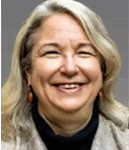 Mira Bjelotomich Irons, MD – Boston Children’s Hospital
Mira Bjelotomich Irons, MD – Boston Children’s Hospital
Program Director; Residency Director; Boston Children’s Hospital
Dr. Irons is a distinguished clinical geneticist and pediatrician, serving as the Associate Chief of the Division of Genetics and Genomics at Boston Children’s Hospital, a faculty member at Harvard Medical School, and the Program Director for the Harvard Medical School Genetics Training Program. She earned her medical degree from Northwestern University’s Feinberg School of Medicine and completed her pediatric residency and genetic fellowships at Massachusetts General Hospital and Boston Children’s Hospital. Board-certified in Clinical Genetics, Clinical Biochemical Genetics, and Pediatrics, Dr. Irons has over 40 years of experience in academic medicine and clinical practice. She has held leadership roles in national genetics organizations, including the American College of Medical Genetics and Genomics (ACMG), and has made significant contributions to clinical care, education, and advocacy in genetics and genomics.
Joan Stoler, MD – Boston Children’s Hospital
Dr. Stoler is a clinical geneticist at Children’s Hospital Boston and Assistant Professor of Pediatrics at Harvard Medical School. She is board certified in pediatrics and clinical genetics. She has evaluated and followed many patients over the last eighteen years, both adults and children with connective tissue disorders, such as Marfan syndrome and Ehlers Danlos syndrome. She has been a co-investigator on a study of mitral valve prolapse in Marfan syndrome and written an article on chronic pain in Ehlers Danlos Syndrome.
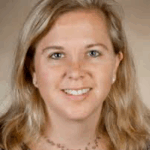 Lauren Massingham, MD – Site Director, Boston Children’s Hospital
Lauren Massingham, MD – Site Director, Boston Children’s Hospital
Lauren Massingham, M.D., is the Site Director at Boston Children’s Hospital for the Medical Genetics Training Program. She is a board-certified clinical geneticist and pediatrician with clinical and research interests in pediatric and cancer genetics. Dr. Massingham received her medical degree from the University of Vermont College of Medicine and completed her pediatrics residency at the University of Massachusetts Memorial Medical Center, followed by a residency in medical genetics at Tufts University School of Medicine. In addition to her clinical work, she participates in multidisciplinary clinics focused on cancer predisposition and hereditary cardiovascular genetics. She is actively involved in genetics education and contributes to the curriculum at the Warren Alpert Medical School of Brown University. Dr. Massingham is also a member of the Association of Professors of Human and Medical Genetics (APHMG), where she works to advance education in the field of medical and graduate genetics.

Gerard T. Berry, MD – Boston Children’s Hospital
Gerard T. Berry, M.D. is co-director of the Clinical Biochemical Genetics program and director of the Medical Biochemical Genetics program. Dr. Berry specializes in biochemical genetics (metabolism). He is the Director of the Metabolism Program at Children’s Hospital Boston and Professor of Pediatrics at Harvard Medical School. Dr. Berry holds Board Certifications in Pediatrics, Biochemical Genetics, and Pediatric Endocrinology.

Aya Abu-El-Haija, MD
Dr. Aya Abu-El-Haija is an attending physician in the Division of Genetics and Genomics at Boston Children’s Hospital. She completed her Medical Genetics fellowship from the University of California San Francisco. She did her Pediatrics residency at University of Medicine and Dentistry of New Jersey (Rutgers). Dr. Haija has a great interest and expertise in the various genetic syndromes, chromosomal deletions or duplications, single gene disorders, developmental delays, congenital birth defect, learning disability, overgrowth syndromes, and has particular interest in the various tumor predisposition syndromes. Dr. Haija is enthusiastic to see patients from various race/ethnic backgrounds, is bilingual in Arabic and English, and has some Spanish and French knowledge.
Olaf Bodamer, MD, PhD
Associate Chief, Genetics and Genomics; Director, Lysosomal Storage Disease (BoLD) Program; Director, Roya Kabuki Program, Boston Children’s Hospital
Dr. Bodamer earned his medical degree from the University of Heidelberg, Germany, and completed his PhD at the University of Saarland, Germany. After pediatric residencies in Germany and at Great Ormond Street Hospital in London, he completed a fellowship in Clinical and Biochemical Genetics at Baylor College of Medicine in Houston, Texas. Previously, he directed the Austrian Newborn Screening Program before joining the University of Miami as the founding Chief of the Division of Clinical and Translational Genetics and Director of the Medical Genetics Laboratories. Since 2015, Dr. Bodamer has served as Associate Chief for Genetics and Genomics at Boston Children’s Hospital, where he established a dedicated research laboratory. He leads the Lysosomal Storage Disease (BoLD) Program and the Roya Kabuki Program at Boston Children’s. Dr. Bodamer is an active member of multiple editorial and scientific advisory boards, including Molecular Genetics and Metabolism, Journal of Inherited Diseases, Translational Medicine, and the Translational Journal of Rare Disease, as well as patient advocacy organizations such as All Things Kabuki and the Organization for Albinism and Hypopigmentation (OAA).
 Gerald Cox, MD – Boston Children’s Hospital
Gerald Cox, MD – Boston Children’s Hospital
Clinical Genetics
Gerald Cox is faculty at Boston Children’s Hospital.
Clinical Lead; Staff Physician in Genetics, Boston Children’s Hospital; Instructor in Pediatrics, Harvard Medical School
Dr. Gerald Cox is a clinical geneticist with over 25 years of clinical practice at Boston Children’s Hospital and more than 20 years in the biotechnology industry. He received his MD and PhD from the University of California at San Diego and completed his pediatrics and genetics training at Boston Children’s Hospital. Dr. Cox began his industry career at Genzyme in 2000 as the company’s first clinical geneticist and advanced to Vice President of Clinical Development for Rare Diseases. He led pivotal clinical development programs for enzyme replacement and substrate reduction therapies for lysosomal storage disorders, contributing to the approval of treatments for MPS I, MPS II, Gaucher disease types 1 and 3, infantile Pompe disease, and Niemann-Pick disease type B. From 2016 to 2018, Dr. Cox served as Chief Medical Officer at Editas Medicine, overseeing the first IND application for in vivo CRISPR-based gene editing to treat Leber congenital amaurosis type 10. Board-certified in clinical, biochemical, and molecular genetics, Dr. Cox continues to teach and see patients part-time at Boston Children’s. He has authored over 90 peer-reviewed publications and serves on multiple patient advocacy and scientific advisory boards, including the National Tay-Sachs and Allied Diseases, NORD, the Barth Syndrome Foundation, and CTNNB1 Connect and Cure.
Millie Anne Ferrés, MD – Beth Israel Deaconess Medical Center
Board certified in Obstetrics and Gynecology, Maternal Fetal Medicine and Medical Genetics. Dr. Ferrés is a physician in the Department of Obstetrics and Gynecology at Harvard Medical Faculty Physicians at Beth Israel Deaconess Medical Center and an Instructor in Obstetrics and Reproductive Biology at Harvard Medical School. She is the Assistant Director of the Maternal Fetal Medicine/Medical Genetics combined training program at Beth Israel Deaconess Medical Center working along with Dr. Barbara O’Brien and Dr. Joan Stoler, and is the Site Director for the HMSGTP Prenatal Genetics rotation.
Judy Garber, MD – Dana Farber Cancer Institute
Director, of Cancer Genetics and Prevention Disease Center Dana-Farber Cancer Institute
Judy E. Garber, M.D., MPH, is Director of the new Cancer Genetics and Prevention Disease Center at the Dana-Farber Cancer Institute. She is attending physician at Dana-Farber’s Breast Oncology Center, an associate physician at Brigham and Women’s Hospital and an associate professor of Medicine at Harvard Medical School. Dr. Garber is currently president-elect of American Association for Cancer Research, the largest organization of cancer researchers in the world. She is a member of the NCI Board of Scientific Counselors and chairs the External Advisory Board of the SPORE in Breast Cancer at MD Anderson Cancer Center. She serves on the Scientific Advisory Board of the Breast Cancer Research Foundation and is a member or chair of the Data Safety Monitoring Committees of several international breast cancer clinical trials. Locally, she co-chairs a Dana-Farber/Harvard Cancer Center Institutional Review Board panel D, and is a member of the Personalized Cancer Medicine Partnership Steering Committee and Executive Committee for Clinical Research. To foster the incorporation of cancer genetics into clinical practice, Dr. Garber has played a major role in the development of national guidelines in genetics (American College of Medical Genetics) and medical oncology (American Society of Clinical Oncology and National Comprehensive Cancer Network.) Her research activities include the study of breast cancer risk assessment and communication, cancer genetics more broadly, and pharmacogenetics. She is also a leader in research into the characteristics and treatment of triple negative or basal-like breast cancer, the most common form in women with BRCA1 mutations. Her translational research focuses on the evaluation of novel agents targeting DNA repair defects in breast cancer, including PARP inhibitors for treatment and prevention of breast cancer and other BRCA-associated cancers.
 Anne Giersch, PhD – Brigham and Women’s Hospital
Anne Giersch, PhD – Brigham and Women’s Hospital
Director, LGG Fellowship; Assistant Professor of Pathology, Brigham and Women’s Hospital and Harvard Medical School
Dr. Anne Giersch is a board-certified Clinical Cytogeneticist at Brigham and Women’s Hospital with extensive clinical and research experience in genetics. She earned her BA in Biology from Dartmouth College and her PhD in Molecular Biology/Microbiology from Tufts University School of Medicine, completing postdoctoral training at Brigham and Women’s Hospital and the University of Washington. Her clinical work involves cytogenetic analysis of constitutional and cancer specimens using karyotype, FISH, and SNP microarray technologies. Dr. Giersch’s research focuses on the genetics of hearing loss, including age-related hearing loss (ARHL), through projects such as the SEQaBOO newborn sequencing initiative and genome-wide association studies in collaboration with 23andMe. She uses RNA sequencing in mouse models to study gene expression related to ARHL and actively contributes to international efforts including the Genomics England Clinical Interpretation Partnership and the ClinGen Expert Panel for Hearing Loss.
Nina Gold, MD – Massachusetts General Hospital
Nina Gold is a 2018 graduate of the Harvard combined pediatrics and medical genetics residency. She then completed a medical biochemical fellowship at the Children’s Hospital of Philadelphia. She is an attending physician at Massachusetts General Hospital, where she sees pediatric and adult patients for evaluation of genetic and metabolic diagnoses. She is the Director of Prenatal Medical Genetics and Associate Director for Research for Mass General Brigham Personalized Medicine, and has a special interest in medical education.
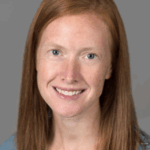 Stephanie Guseh, MD
Stephanie Guseh, MD
Specialist in Birth Defects and Congenital Anomalies; Fetal Care and Surgery Center, Boston Children’s Hospital
Dr. Stephanie Guseh earned her undergraduate degree from Yale University in 2007 and her medical degree from Harvard Medical School in 2011. She completed her internship, residency, and fellowship at Brigham and Women’s Hospital and Massachusetts General Hospital in Boston, concluding in 2019. Dr. Guseh specializes in birth defects, congenital anomalies, prematurity, and prenatal ultrasound, with a clinical focus on fetal care and surgery. She is an integral member of the Fetal Care and Surgery Center at Boston Children’s Hospital. Dr. Guseh has contributed to advancing prenatal diagnostics and fetal interventions, with recent publications on noninvasive fetal exome screening, fetal cardiac interventions, and prenatal cfDNA screening for single-gene conditions. Her work supports improved outcomes for neonates with critical congenital heart disease and complex fetal conditions.
David Harris, MD – Boston Children’s Hospital
Clinical Genetics Boston Children’s Hospital
Clinical Geneticist, Boston Children’s Hospital; Lecturer in Pediatrics, Harvard Medical School
Dr. David Harris is a clinical geneticist with over 20 years of experience, providing expert diagnostic and counseling services at Boston Children’s Hospital. He earned his medical degree from the University of Rochester School of Medicine and Dentistry. Dr. Harris is actively involved in research to improve understanding of genetic disorders, including his work with the Developmental Anatomy Project under the direction of Cynthia Morton, PhD, which focuses on identifying genes disrupted by balanced chromosome rearrangements. More recently, he has contributed to studies on brain abnormalities in collaboration with the Walsh laboratory. In addition to his clinical and research roles, Dr. Harris is a Lecturer in Pediatrics at Harvard Medical School. He is committed to advancing genetics education and patient care in pediatric populations.
Ingrid A. Holm, MD, MPH – Boston Children’s Hospital
Dr. Holm is Professor of Pediatrics at Harvard Medical School, and is faculty of the Division of Genetics and Genomics and the Division of Endocrinology at Boston Children’s Hospital. She has broad experience in basic science and clinical research, and in clinical practice. Dr. Holm’s research interest is focused on the Ethical, Legal, and Social Implications (ELSI) of genomics. She has been a principal investigator or co-investigator on a number of NIH-funded grants studying the impact of returning genomic information to participants, families, and health care providers, including several national Networks and Consortia where she has held leadership positions. Dr. Holm’s other area of research interest is in genetic studies of rare diseases, including sudden unexpected death in pediatrics (SUDP), disorders of sex development, and the Undiagnosed Diseases Network (UDN) Harvard Clinical site. Dr. Holm has been a member of Boston Children’s Hospital Institutional Review Board (IRB) since 2006, and she is a member of the NIH All of Us (Precision Medicine Initiative) Research Program IRB. Dr. Holm’s clinical expertise is in disorders of sex development, and in genetic and metabolic bone diseases.

Amy Kritzer, MD – Boston Children’s Hospital
Dr. Kritzer is an attending in the Division of Genetics and Genomics at Boston Children’s Hospital. She graduated from the Albert Einstein College of Medicine in Bronx, NY. She did her Pediatrics residency at The Floating Hospital for Children at Tufts Medical Center in Boston, MA and then completed fellowships in Clinical Genetics and Medical Biochemical Genetics at Boston Children’s Hospital. Her clinical work is focused on the care of children and adults with rare metabolic disorders. She serves as physician lead for Quality Improvement in the Division of Genetics. As QI lead, she creates and implements patient care initiatives designed to improve patient safety and patient and family experience. Her work is dedicated to addressing the psychosocial needs of patients with rare diseases with a focus on improving quality of life. She serves as a Principal Investigator for several lysosomal storage disease registries, as co-director of the BoLD lysosomal storage disease program at Boston Children’s and as one of the main physicians for the PAL clinic
Harvey Levy, MD – Boston Children’s Hospital
Co-Director, Clinical Biochemical Genetics Fellowship
Harvey Levy, M.D. is co-director of the HMS ABMG Clinical Biochemical Genetics program. Dr. Levy specializes in biochemical genetics (metabolism). He is Senior Physician in Medicine/Genetics at Children’s Hospital Boston and Professor of Pediatrics at the Harvard Medical School. He was formerly Director of the Metabolic Program and currently serves as an attending physician within the program. Dr. Levy conducts clinical research in two areas of metabolism, phenylketonuria (PKU) and clinical and biochemical follow-up of newborn screening for metabolic disorders. He has very active research projects ongoing in those areas.
Azra Ligon, PhD – Brigham and Women’s Hospital
Director, Cytogenetics
Azra H. Ligon, Ph.D., oversees training in the HMS ABMG Clinical Cytogenetics program. Dr. Ligon received her Ph.D. in Cancer Biology from the University of Texas/M.D. Anderson Cancer Center in 1995. She completed her Medical Genetics training at Baylor College of Medicine in 1997 and, after a research postdoctoral fellowship at Brigham and Women’s Hospital (BWH), joined the Staff of the BWH Cytogenetics Laboratory in 1999 as an ABMG-certified Clinical Cytogeneticist. In 2003, she assumed leadership of the HMS ABMG Cytogenetics training program. Dr. Ligon’s research activities include translation of basic research findings into clinical diagnostics, especially those relevant to the area of cancer diagnostics.
Angela Lin, MD – Massachusetts General Hospital
Clinical Genetics
Angela Lin trained in pediatric cardiology and medical genetics. As a clinical geneticist at MassGeneral Hospital for Children, her general genetics clinic is on Friday morning, supplemented by Cardiogenetics Clinic (including the MGH HHT Service), Craniofacial Clinic, Turner Syndrome Clinic, CHARGE Syndrome Clinic, and her interest in Costello and related Ras/MAPK syndromes. She works in the Active Malformation Surveillance Program at the BWH, and works at the MA Dept. Public Health as the geneticist for the Massachusetts Center for Birth Defects Prevention. Her clinical research interest focuses on syndrome delineation, cardiovascular anomalies in syndromes, and the epidemiology of CHDs. Dr. Lin is an Associate Editor for the American Journal of Medical Genetics. She works with several consumer advocacy groups including the Costello Syndrome Family Network and Turner Syndrome Society of America.
 Heather Mason-Suares, PhD – Partners HealthCare Personalized Medicine
Heather Mason-Suares, PhD – Partners HealthCare Personalized Medicine
Director, Molecular Genetics and LGG Fellowship
Heather Mason-Suares, Ph.D., is an Assistant Director at Partners’ Personalized Medicine Laboratory for Molecular Medicine and the Cytogenetics Laboratory at Brigham & Women’s Hospital Center for Advanced Molecular Diagnostics. She also oversees training in the HMS ABMGG Clinical Molecular Genetics program. Dr. Mason-Suares received her Ph.D. in Genetics from Case Western Reserve University in 2010. She completed her Clinical Molecular Genetics and Cytogenetics training at Emory School of Medicine in 2014. Her current research and clinical interests concern the application of molecular diagnosis using next-generation sequencing and microarray technologies to chromosomal abnormalities in prenatal cases, RASopathies, and cardiomyopathy.
David Miller, M.D., PhD – Boston Children’s Hospital
David T. Miller, MD, PhD, FAAP, FACMG is an Associate Professor of Pediatrics at Harvard Medical School and Director of the Multidisciplinary Neurofibromatosis (NF) Clinic and NF Research Initiative (NFRI) at Boston Children’s Hospital. Dr. Miller is a practicing Medical Geneticist, both in direct patient care and laboratory genetics. His clinical, research, and teaching activities are focused on clinical expertise and innovation in delivering clinically effective and appropriate diagnostic genetic testing services. He has led or served on several national committees and advisory boards focused on best practices for clinical genetics and genetic testing, including: Co-Chair of the ClinGen Gene Curation Expert Panel for Autism and Intellectual Disability; Chair of ACMG’s Professional Practice and Guidelines Committee; Co-Chair of ACMG’s Secondary Findings Maintenance Working Group; Member of ACMG’s Evidence-Based Medicine Working Group; Member of ACMG’s Topic Selection Committee. He currently serves as Deputy Editor of Genetics in Medicine. After receiving his MD and PhD from Washington University School of Medicine in St. Louis, he completed a residency in Pediatrics at Yale-New Haven Hospital, and residency/fellowship in Medical Genetics and Clinical Molecular Genetics at Harvard Medical School. He is board-certified in Clinical Genetics and Clinical Molecular Genetics.
Cynthia Morton, PhD – Brigham and Women’s Hospital
Education Director
Cynthia Morton, Ph.D. is the William Lambert Richardson Professor of Obstetrics, Gynecology and Reproductive Biology and Professor of Pathology at Harvard Medical School, Associate Director of the Partners HealthCare Center for Personalized Genetic Medicine, Education Director for the HMS Genetics Training Program and Director of Cytogenetics at Brigham and Women’s Hospital. Her research interests are in molecular cytogenetics, hereditary deafness, genetics of uterine leiomyomata, hereditary hearing loss, and cytogenetic approaches to gene discovery for developmental disorders. Her full-time academic laboratory contributed to the development of diagnostic testing for chromosome studies that cross the lifespan, which include preimplantation and prenatal diagnostics, perinatal and childhood studies in the evaluation of congenital and developmental disorders, infertility and pregnancy loss studies, and cytogenetics of leukemias, lymphomas and solid tumors. Her laboratory has been a major site for training laboratory geneticists in clinical cytogenetics.
Anne O’Donnell, MD, PhD
Co-Director, Broad Institute Center for Mendelian Genomics; Clinical Geneticist, Boston Children’s Hospital; Instructor in Pediatrics, Harvard Medical School
Dr. Anne O’Donnell-Luria is a board-certified clinical and biochemical geneticist and pediatrician at Boston Children’s Hospital. She earned her MD and PhD from Columbia University, where her research focused on DNA methylation in cancer and neuropsychiatric diseases. She completed the Combined Pediatrics-Genetics Residency at Boston Children’s Hospital and a fellowship in Medical Biochemical Genetics. Dr. O’Donnell-Luria co-directs the Broad Institute Center for Mendelian Genomics, leading efforts to analyze thousands of rare disease families to improve diagnosis and gene discovery. She also co-leads the EpiChroma Clinic, focused on epigenetic and chromatin disorders, and sees patients through the Kleefstra Syndrome Clinic, the Metabolism Program, and the Division of Genetics and Genomics. Her research centers on the use of large-scale genomics to understand rare disease and incomplete penetrance, with the goal of improving care for children and families with complex genetic conditions.
Jonathan Picker, MD – Boston Children’s Hospital
Dr. Jonathan Picker is a clinical geneticist at Boston Children’s Hospital with over 25 years of experience in pediatrics and genetics. His research focuses on the neurobiology of behavioral and neurocognitive disorders, including schizophrenia, Fragile X syndrome, and other developmental disorders. He specializes in integrating genomics into personalized medicine, particularly in neurodevelopmental and behavioral health. Dr. Picker earned his medical degree from the University of Aberdeen in Scotland and completed a PhD in Molecular Biology at Newcastle University in England. He further trained in pediatrics, clinical genetics, and child and adolescent psychiatry at Boston Children’s Hospital. He co-founded and co-directs the first Pediatric Pharmacogenomics Clinic in the U.S. and leads the Fragile X Program at Boston Children’s Hospital. His work has earned him prestigious awards, including the Sidney R. Baer Jr. Prize for Mental Health Research.
Huma Rana, MD – Dana-Farber Cancer Institute
Huma Q. Rana, MD is the Clinical Director of the Division of Cancer Genetics and Prevention at Dana-Farber Cancer Institute, and Assistant Professor of Medicine at Harvard Medical School. At Dana-Farber and its affiliates and satellites, Dr. Rana oversees the medical management and the clinical operations that provide care to individuals with rare genetic susceptibilities to cancer. In addition to her clinical work, Dr. Rana leads multiple clinical research projects focused on developing cancer prevention and screening for those with hereditary cancer risk, and novel approaches to improving access to cancer genetics services.
Amy Roberts, MD – Boston Children’s Hospital
Co-Director, Pediatrics/Medical Genetics Residency; Co-Director, Maternal Fetal Medicine/Medical Genetics Fellowship
Amy Roberts, M.D., CHB Department of Cardilogy and Department of Medicine, Division of Genetics Dr. Roberts is a cardiovascular clinical geneticist and supervises trainees in the clinic and on the inpatient consult service. She also teaches in the Advanced Human Genetics course. She is conducting research on genotype-phenotype correlations in Noonan syndrome and congenital heart disease gene discovery. She co-directs the combined Pediatrics/Clinical Genetics residency training program with Ted Sectish, MD, Children’s Hospital Boston.
Lance Rodan, MD
Attending Physician, Pediatric Neurology; Assistant Professor of Pediatrics, Harvard Medical School
Dr. Lance Rodan is a pediatric neurologist specializing in neurometabolic disorders at Boston Children’s Hospital. He earned his medical degree from the University of Toronto in 2008 and brings over 15 years of clinical experience. Dr. Rodan’s research focuses on MRI pattern recognition and functional MRI studies to improve diagnosis and management of neurometabolic conditions. He is a sub-investigator on multiple ongoing clinical trials and an active clinician in the Harvard Undiagnosed Diseases Network (UDN). Dr. Rodan is also a core member of the Brain Development and Genetics (BrDG) Clinic multidisciplinary team, providing expert care for children with complex neurological and genetic conditions.

Stephanie Sacharow, MD
Director, Medical Biochemical Genetics
Dr. Sacharow is a medical biochemical geneticist and metabolic specialist at Boston Children’s Hospital, serving as the Medical Director of the PAL Clinic and Director of the Dr. Harvey Levy Program for Phenylketonuria and Related Conditions. She earned her medical degree from the University of Miami Miller School of Medicine and completed her residency and fellowship at Jackson Memorial Hospital/University of Miami. Board-certified in Clinical Biochemical Genetics, Clinical Genetics, and Pediatrics, Dr. Sacharow has expertise in the management of metabolic diseases including phenylketonuria and homocystinuria. Before joining Boston Children’s and Harvard Medical School faculty in 2015, she was instrumental in implementing expanded newborn screening for metabolic disorders in South Florida. Dr. Sacharow has published extensively, is a co-investigator in multiple clinical trials, and has expertise in pegvaliase (Palynziq) therapy, co-authoring national management guidelines. She is a sought-after speaker at national and international conferences, committed to advancing patient care, research, and education in genetics and metabolism.
 Inderneel Sahai, MD
Inderneel Sahai, MD
Dr. Sahai is a clinical geneticist affiliated with Mass General Brigham for Children’s Genetics Program in Boston, specializing in medical genetics with a focus on pediatric patients. She earned her medical degree from the Armed Forces Medical College and completed residency training at Brigham and Women’s Hospital and Nassau County Medical Center/SUNY Stony Brook. Board-certified in Clinical Genetics and Genomics as well as Clinical Biochemical Genetics by the American Board of Medical Genetics and Genomics, Dr. Sahai offers expertise in genetic testing and comprehensive genetic care. She is fluent in Hindi, Punjabi, and Urdu and provides care at multiple Boston locations including the Yawkey Center for Outpatient Care. Dr. Sahai is committed to integrating genetics and pediatrics to improve patient outcomes in diverse populations.
Brian Skotko, MD – Massachusetts General Hospital 
A Board-certified medical geneticist, Dr. Skotko is the Emma Campbell Endowed Chair on Down Syndrome at Massachusetts General Hospital. As the Director of the hospital’s Down Syndrome Program, he has dedicated his professional energies toward children with cognitive and development disabilities. He co-authored the national award-winning books, Common Threads: Celebrating Life with Down Syndrome and Fasten Your Seatbelt: A Crash Course on Down Syndrome for Brothers and Sisters. He is a graduate of Duke University, Harvard Medical School, and Harvard Kennedy School, and he is currently an Associate Professor at Harvard Medical School. Dr. Skotko is a leader on clinical and translational research about Down syndrome. He has been featured in The Wall Street Journal, The New York Times, The Washington Post, The L.A. Times, NPR’s “On Point,” and ABC’s “Good Morning America.” Dr. Skotko has a sister with Down syndrome and serves on the Honorary Board of Directors for the Massachusetts Down Syndrome Congress.
David Sweetser, MD – Massachusetts General Hospital
Dr. Sweetser is Chief of Medical Genetics and Metabolism at Massachusetts General Hospital and an attending physician in Pediatric Hematology/Oncology. He earned his MD/PhD from Washington University School of Medicine and completed residency and fellowships in Medical Genetics, Biochemical Genetics, and Pediatric Hematology/Oncology. Board-certified in Clinical Genetics and Genomics, Clinical Biochemical Genetics, Pediatric Hematology-Oncology, and Pediatrics, Dr. Sweetser specializes in metabolic diseases, neurodevelopmental disorders, inherited hematologic malignancies, and genetic cancer predispositions. Since 2003, he has led clinical programs integrating genomic sequencing into diagnostics and directs the Pitt Hopkins Clinic. His research focuses on gene discovery, patient-derived stem cell models, and targeted therapies for rare genetic disorders including Pitt Hopkins Syndrome and IQSEC2-related disorder. Dr. Sweetser holds the Lewis and Leslie Holmes Endowed Chair in Genetics and Teratology and serves as the Harvard Medical School Genetics Training Program Site Director.
 Wen-Hann Tan, MD – Boston Children’s Hospital
Wen-Hann Tan, MD – Boston Children’s Hospital
Course Director, Advanced Human Genetics Course
Dr. Wen-Hann Tan is a clinical geneticist at Boston Children’s Hospital who is interested in a broad variety of genetic conditions including genodermatoses, vascular anomalies, pediatric cancer predisposition syndromes, the ASXL group of disorders, and all things ultra-rare. He leads a clinical research program that focuses on Angelman syndrome and is actively involved in observational / natural history studies as well as various clinical trials in Angelman syndrome, including the use of antisense oligonucleotides (ASO). He is also the site PI of a gene therapy trial in ornithine transcarbamylase (OTC) deficiency.
Christopher Walsh, MD, PhD – Boston Children’s Hospital
Dr. Walsh is the Chief of the Division of Genetics at Children’s Hospital Boston as well as Professor of Neurology and Pediatrics at Harvard Medical School, Associate Member of the Broad Institute, and Senior Associate in Neurology at Beth Israel Deaconess Medical Center. Dr. Walsh is interested in genes that regulate the development and function of the human cerebral cortex. More information can be found here: www.walshlab.org
Monica Wojcik, MD – Boston Children’s Hospital
Dr. Wojcik is a clinician-researcher in the Divisions of Newborn Medicine and in Genetics and Genomics at Boston Children’s Hospital. Her academic focus is on the application of genomic medicine in infancy, and she has a particular interest in using genomic sequencing to understand infant mortality and in the influence of social determinants of health on the genetic diagnostic odyssey. Overall, Dr. Wojcik’s research strives to apply her unique clinical background to improve infant health outcomes. Clinically, she attends in the neonatal intensive care unit and on the genetics/metabolism consult service at Boston Children’s Hospital, and she leads a developmental support program for infants with rare genetic conditions.
William J. Brucker, MD, PhD – Boston Children’s Hospital
Dr. Brucker is a clinical geneticist in the Division of Genetics at Boston Children’s Hospital and Hasbro Children’s Hospital, and an assistant professor of pediatrics at The Warren Alpert Medical School of Brown University. He earned both his medical degree and PhD in biology from Brown University, completed his pediatric residency at Connecticut Children’s Medical Center, and his fellowship in clinical genetics at Boston Children’s Hospital. Board-certified in Pediatrics, Dr. Brucker specializes in clinical genetics with interests that include developmental disorders, metabolic conditions, and rare genetic diseases. He is an active member of the American Academy of Pediatrics and serves on the Young Researchers Board of Ketotic Hypoglycemia International. Dr. Brucker is dedicated to advancing the care of children with complex genetic conditions through clinical care, research, and medical education.
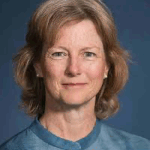 Helen Lyon-Feeney, MD, MS – Boston Children’s Hospital
Helen Lyon-Feeney, MD, MS – Boston Children’s Hospital
Dr. Lyon-Feeney is Director of the Clinical Genetics Program at Boston Children’s Hospital with over two decades of experience in pediatrics and clinical genetics. She earned her undergraduate degree from Mount Holyoke College and a master’s in public health from the Harvard T.H. Chan School of Public Health. She has served in clinical genetics roles at Boston Children’s Hospital, Beth Israel Deaconess, and Brigham and Women’s Hospital, and previously led the Cardiovascular Genetics Program at UMASS Memorial. Her clinical interests include genetic and developmental disorders such as Down syndrome, Marfan syndrome, Beckwith-Wiedemann syndrome, and autism spectrum disorders. Dr. Lyon-Feeney has also contributed to medical education at the University of Massachusetts Chan Medical School and remains committed to advancing genetics care through clinical practice and teaching.
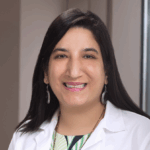 Neha Bhatia, MD – Boston Children’s Hospital
Neha Bhatia, MD – Boston Children’s Hospital
Dr. Bhatia is an attending physician in the Division of Genetics and Genomics at Boston Children’s Hospital and an Instructor of Pediatrics at Harvard Medical School. She earned her medical degree from the Stony Brook School of Medicine and completed her pediatric residency and medical genetics fellowship at Albert Einstein College of Medicine. Board-certified in Pediatrics and Clinical Genetics and Genomics, Dr. Bhatia has clinical expertise in a range of genetic conditions including Angelman syndrome, Beckwith-Wiedemann syndrome, neurofibromatosis, and congenital anomalies. She previously held positions at Tufts Medical Center and Children’s Hospital at Montefiore, and conducted research in Singapore as part of the Undiagnosed Disease Program.
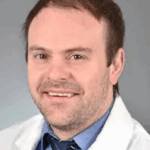 Roy Peake, PhD – Boston Children’s Hospital
Roy Peake, PhD – Boston Children’s Hospital
Director, Clinical Biochemical Genetics
Roy Peake received his PhD from Queen’s University of Belfast, Northern Ireland, and began his career as a clinical biochemist in the UK’s National Health Service. He completed fellowships in Clinical Chemistry at Boston Children’s Hospital and in Clinical Biochemical Genetics at Harvard Medical School. He is currently the Director of the Biochemical Genetics Laboratory and Associate Director of Clinical Chemistry in the Department of Laboratory Medicine, as well as an Assistant Professor of Pathology at Harvard Medical School. Dr. Peake is board certified in both Clinical Chemistry and Clinical Biochemical Genetics and is a Fellow of the Royal College of Pathologists. He serves as Training Director for the ABMGG-accredited Clinical Biochemical Genetics Training Program and is an Associate Editor for Clinical Chemistry. His research focuses on developing new diagnostic methods for inborn errors of metabolism using chromatography-mass spectrometry.
